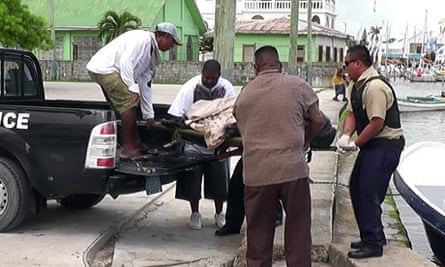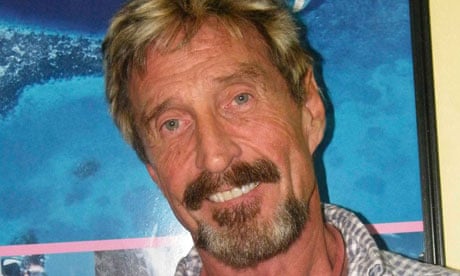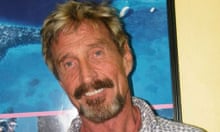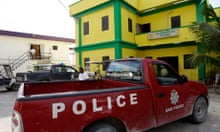The name McAfee is ubiquitous and boring, a piece of antivirus software that pops up on computer screens around the world. The man behind this reassuring piece of technology is rather less reassuring and certainly not dull. John McAfee, a multi-millionaire dotcom guru, is on the run from police on the tropical island of Ambergris Caye. The authorities want to question McAfee, who is 67, about the murder of his neighbour, Gregory Faull. Now, according to a blog purportedly written by McAfee, the American entrepreneur is protesting his innocence and gleefully revealing how he hid from police by burying himself in the sand and by pretending to be a drunk German tourist.
The story of McAfee's rise and fall is impossibly rich and strange. McAfee has likened his predicament to Julian Assange's; others see him as a Kim Dotcom figure, a playboy-on-the-run, a poster boy for the decadent libertarianism of the dotcom generation. But McAfee is harder to pin down. Until the tanned, rich, priapic, yoga-loving eccentric hands himself in, he exists for all of us only on the internet. To some, McAfee is a gun-toting fiend and a fugitive from justice; in McAfee's eyes, he is a teetotal tragic victim of a corrupt state and media sensationalism, a philanthropist dedicated to cleansing rural Belize of crime and poverty. People who know him variously describe him as generous, paranoid, impulsive and eccentric. Is he mad? Is he bad? Who is John McAfee?
It is hard to know what is real and what is not in McAfee's story. He was born in England but was raised in Virginia. He still speaks in a courtly, southern style and is still emotionally scarred by his heavy-drinking father, who McAfee says, regularly beat him and his mother. Drugs – their presence and absence – have been one constant in his life. He drank heavily as a student, and was kicked out of university in Louisiana where he was studying for a PhD in mathematics because he slept with one of his undergraduates, who became his first wife. McAfee went on the same Nepalese hippie trail as Steve Jobs, the founder of Apple, and was fired from an early job for buying marijuana. In 1969, McAfee discovered LSD while creating computerised timetables for a train company. By 1983, he had risen to become director of engineering for a Californian tech company but, according to an ebook rushed out by Wired journalist Joshua Davis who interviewed McAfee at length this year, he was also a voracious cocaine addict, who also sold the drug to his subordinates. He lost his wife, his job, his beloved dog and eventually turned to Alcoholics Anonymous. He claims he has been sober ever since.
A few years later, McAfee learned of one of the first computer viruses. He was not a programming wizard but, at his home in California, his employees devised some software to disarm viruses. What was really revolutionary was the way McAfee gave his product away digitally, via an online bulletin board. Soon he had 30 million users and by 1990 was collecting $5m a year from corporate licensing fees. As a student he supported his drinking habit by working as a door-to-door salesman and he never lost this panache; his hyping of virus threats saw his company valued at half a billion dollars by 1994. Apart from establishing a new model for e-commerce by giving away his software, McAfee's other real legacy, says Davis, was the marketing of his paranoia. "What he was very successful at is infecting the rest of us with his own paranoia, which is an extraordinary accomplishment." Two years ago, McAfee's company was bought by Intel for $7.68bn but McAfee had long ago sold his $50m-$100m stake. To those who portray McAfee's life as one of squandered opportunities to become the next Steve Jobs, Davis says: "He's a guy who comes up with ideas. As a startup guy he's been wildly successful."
For two decades, he lived the quirky life of a dotcom entrepreneur with his second wife, Judy, in a mansion in the Colorado Rockies. He says he sold another internet telephony startup, Tribal Voice, for $17m in 1999, founded a yoga institute, wrote books about spirituality and helped build a rehab centre in Hawaii. Around the time of his divorce 10 years ago, he discovered lightweight aircraft called "trikes" and learned how to fly these machines a few metres above the deserts of New Mexico. He called this insanely dangerous new sport "aerotrekking", built a desert ranch with an airstrip and hung out with a bunch of adrenalin junkies who called themselves Sky Gypsies. Five years ago, when he first met the journalist Jeff Wise, who, like Davis, has extensively researched his life, McAfee said: "Success for me is, can you wake up in the morning and feel like a 12-year-old?"
Four years ago, there was an abrupt change of direction. McAfee began selling his properties in Hawaii, New Mexico, Colorado and Texas. After apparently divesting himself of his US-based wealth, McAfee bought a villa on Ambergris Caye after seeing it on Google Earth. "He went to Belize because he could act out his ultra-libertarian dreams," thinks Wise. It may have been a rejection of materialism but moving to Belize was also, Wise and Davis agree, motivated by McAfee's fear that his wealth would be gobbled up by lawsuits – some serious, some trivial. Of most concern was a fatal aerotrekking accident which caused the death of McAfee's nephew, Joel Bitow, who was flying 61-year-old passenger Robert Gilson. Gilson's family launched a $5m claim against McAfee.
The semi-retired entrepreneur flung himself into life in Belize, setting up a cigar manufacturer, a coffee distributor and a water-taxi service. When he bumped into Allison Adonizio, an attractive 31-year-old microbiologist on an extended vacation, he became entranced by the idea of finding natural antibiotics in the Belizian rainforest – he'd fought off digital diseases, now he could fight organic ones.
So he did what millionaires do: he offered Adonizio the job of a lifetime and built her a lab in a new jungle property. According to an interview Adonizio gave to Wise, however, she revealed she was also tasked with another of McAfee's preoccupations: finding a herbal compound to enhance the female libido. Then, it seems, McAfee got distracted, and began hanging out in Lover's Bar, a terrible karaoke shack and brothel not far from his jungle home. His girlfriend of more than a decade – whom he had been with since she was 19 – left, as did Adonizio, and McAfee took up with a series of local women, including a gun-toting 16-year-old. He became passionate about ridding a local village, Carmelita, of crime and drug trade: he donated money for a school canteen, built a police station, gave the police rifles and batons, and began paying them. Increasingly fearful for his safety, he imported pump-action shotguns and hundreds of rounds of ammunition to protect his compound. He started employing local gangsters but says he did so because they threatened to kill him. At Davis' final meeting with McAfee in August – during which he tormented the journalist with a game of Russian roulette – he found the millionaire living with five young women.
To the government, McAfee's manic activity looked like that of a drug lord. McAfee's compound was stormed by armed members of Belize's commando-style Gang Suppression Unit in April this year. McAfee was freed after no illegal drugs of any kind were found. Briefly detained, McAfee was free but still a "person of interest" according to the authorities. And then, on 11 November, his life really began to spiral out of control.

Gregory Faull, a 52-year-old expat American businessman who lived near McAfee, was found in a pool of blood with a single gunshot wound to his head. Like other neighbours, he had complained to McAfee about the noise from the half dozen dogs McAfee kept at his home. The Belize police said McAfee was "a person of interest" and the entrepreneur went on the run, claiming this was the latest harassment of him. He feared for not just his liberty but for his life. Since then, McAfee has revealed more extraordinary stories: he claims the police poisoned his dogs, that he hid from them by burying himself in sand with a cardboard box over his head, and then returned to the crime scene in an assortment of elaborate disguises. Most recently, he has offered a $25,000 reward for the "capture of person or persons responsible for Mr Faull's murder".
Since then, McAfee has attracted saturation media coverage. Is he "bonkers" as the Belize prime minister said? Or is he oppressed? Or has the former addict returned to drugs? In 2010, McAfee posted about MDPV, a psychoactive stimulant found in bath salts, on a drugs message-board. He found it "the finest drug ever conceived, not just for the indescribable hypersexuality but also for the smooth euphoria and mild comedown". More recently, MDPV has gained the alarmist soubriquet "the zombie drug" after a user chewed the face of another man in Florida. [see footnote] McAfee posted about how he was producing MDPV but then told Davis this was all an elaborate prank to try to generate 1,000 posts on the web forum. "My life is fucked up enough without drugs, and always has been," McAfee told Wired magazine. Most recently, McAfee blogged: "I have repeatedly stated I do not do drugs and am seriously opposed to drugs."
If it sounds weird that McAfee would lie about drugs, this deceit (or not) perfectly encapsulates his character. In hacker culture, messing with people's heads is called "social engineering". As Wise writes: "McAfee's undertakings in this vein have been as plentiful and spontaneous as his ventures in capitalism, and range from the sprawling to the picayune." McAfee appears to have posted all kinds of untruths about himself on the internet – about where he lives, and what he does. "One of his hobbies is he loves to hoax the press – that's one of his great joys in life," says Wise.
Is the blog another trick? Both Davis and Wise believe the blog is genuinely written by McAfee. But before he began it, the people he subjected to more myths and stunts than anyone else were journalists. This profile of McAfee is heavily reliant on the hard work of two American journalists who have got closer to McAfee than anyone else: Joshua Davis and Jeff Wise. Can we trust their accounts? Davis's book is lucid but Wise is critical of his rival for publishing "McAfee's often outlandish claims without qualification". And McAfee has taken to his blog to slander Wise for making "a life work out of smearing my character", alleging it was because his entourage once sent Wise's wife incriminating pictures of the journalist with another woman on his first assignment with McAfee. Wise says these allegations are "absolutely ridiculously false" and a classic example of McAfee's modus operandi. "It's a fine line between clever PR and outright lying," says Wise. "He's impulsive. He likes to control people. He likes to get attention, get people to do what he wants to do, and especially do what they don't want to do."
"At the moment he's very clearly trying to mess with everybody's heads," says Davis, who spoke to McAfee on the phone two days ago. He describes him as "extremely intelligent, extremely paranoid". "I asked him: 'What is the end game?' and he said: 'Stay out of custody.'" Davis thinks he is deliberately trying to confuse people – a rational tactic by a man on the run. After six months investigating McAfee's claims about his persecution by the Belizean authorities, Davis concludes that McAfee is mistaken. "I'm more inclined to believe the Belizean authorities raided him in April because they just didn't understand who this guy was and what he was doing."
Researching McAfee through the internet and secondary sources, I feel no closer to finding out who he really is. Just as we are going to press, McAfee emails me with a number to call him on. Is the blog really him? "Of course it's me," he says in a calm voice, calling me "sir" throughout our 10-minute conversation. The suggestion he is a "person of interest" in the murder of Faull is "absurd", he says. "What earthly motive could I have had?" One theory was that McAfee believed Faull had poisoned his beloved dogs. "I knew at the time he could not have killed my dogs – he was a dog lover," he says of Faull. He says he is still in Belize and has no intention of handing himself in. "The last person who turned himself in was handcuffed behind his back and shot 14 times." He hopes to draw attention to the injustices in Belize, the abuse of "hundreds" of local people by the GSU and the country's retreat from democracy. He wants local people to force the resignation of members of the current government, including the prime minister. "Even the most sheep-like people will say, 'boot these people out,'" he says of the regime.
If McAfee is famously tricksy, what does he think of his unofficial biographers? Is Davis's account reliable? "Absolutely not," claims McAfee but when I ask for details he only objects to Wired magazine using a photograph of him topless, wielding a shotgun. He has not read Davis's ebook but takes issue with the portrayal of himself as paranoid. "I don't see myself as paranoid. In April this year 42 soldiers stormed my compound and held me in the blazing sunshine for 14 hours without food or water."
McAfee says he is not interested in promoting his "legacy". What is his greatest success? "My greatest success was getting off of drugs and alcohol in 1983. That was the most difficult thing I've done." And now? "I intend to stay in Belize," says the multimillionaire on the run, "because this is my home."




Comments (…)
Sign in or create your Guardian account to join the discussion